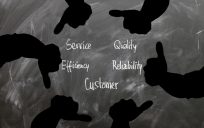The other day someone asked me, “how do you justify the time you spend on Facebook and Twitter – don’t you have real work to do?” This was after I told my wife that I couldn’t make dinner yet because I had to finish up some work, only to have her chastise me for responding to some messages that I received on our company’s Yammer feed. Presumably, if I had instead been working in a spreadsheet or typing an email, neither question would have been asked.
But why should it be any different? When we’re talking about social media, why does the medium matter more than the content? Why is it professionally acceptable to send a client an email than a Facebook message? Why is writing a white paper looked at as real work but a blog post isn’t? I’ve been asked to justify the ROI on individual blog posts, but no one has ever asked me to demonstrate the ROI of any of the hundreds of emails I send every day.
Shouldn’t the content be what determines what is considered work, not the medium? Why is social media held to this impossibly high standard when other technology isn’t?
This double standard has frustrated me for years – just once, I’d like to go through my colleagues’ emails and phone calls and ask them to justify all of their time spent using their technology. “Hmmm….looks like you’ve sent the same email out five different times – seems like a lot of unnecessary duplication! What’s with these status meetings you keep going to – are they bringing in any additional sales?”
Here’s the thing – the effectiveness of social media, like other forms of communication, should be measured at the macro, not the micro, level. Measured in a vacuum, all of those emails, phone calls, and business lunches wouldn’t mean much either. But taken as a whole, they paint a much different picture. You had lunch together, which led to a follow-up phone call, which led to a marketing meeting at his office, which led to another phone call, which then led to a new contract – congratulations! While that last phone call may have sealed the deal, that doesn’t mean that that lunch you had two months ago wasn’t just as, if not more, important. Just because it didn’t directly lead to a new contract doesn’t mean your time at that lunch was worthless – it helped you build that relationship.
The same is true in social media. While that Tweet about your favorite movie may not be related to your core business and wasn’t retweeted hundreds of times, that by itself doesn’t mean anything. There should be ebbs and flows in the content you post, and while individually, those tweets about your favorite movies may not contribute directly to those all important metrics, they do help lay the foundation that will allow everything else to be more effective.
Now, whenever someone asks me to justify the time I spend here, or on Twitter or Facebook, my responses usually end up sounding something like this:
- “Remember when you needed a contact at that government agency and I was able to connect you with Joe? Yeah, Joe and I have exchanged a few messages over Twitter – he’s a great guy”
- “You know how we got that project of yours highlighted in the New York Times last week? I read the reporter’s blog and he recognized my name from all the comments that I’ve left there”
- “Those two junior employees we just hired who you absolutely love? I actually met them at a conference last year and kept in touch via Facebook, so when I saw they were frustrated with their jobs, I reached out and brought them in for interviews.”
Trying to parse this out and determine the ROI of a single tweet, blog post, or Facebook status is a futile, short-sighted effort.That’s why the Twitter feeds for most big organizations are unbelievably boring – we need to make sure that we track the ROI for every post, link, and tweet!! Instead of measuring each of these things individuals, try looking at it holistically. If you do, the ROI of the relationships that you form over time will actually be pretty easy to demonstrate.
*Image courtesy of Flickr user russeljsmith




How about a new measure – Return on Serendipity (ROS)? How many times have you read a tweet/Facebook status/posting/LinkedIn Discussion where someone mentions a concept/news item/recent study that was the key for a problem or innovation at work?
I had this idea when I recently finished the fifth edition of Diffusion of Innovations by Everett Rogers and thought about combining Diffusion analytical methods with social network theory. Rogers has some examples of this combination in the book but with the advent of online social networking technologies, we can actually quantitatively trace the innovations as they progress through networks and into organizations.
I also want to tie complexity economics and memetics into ROS because I often read anecdotes about how a chance comment or chance meeting led to a multimillion dollar product or service. There should be some general theory that accounts for the impacts of these serendipitous events.
Amen!
Love Return on Serendipity…
Love that phrase too Bill!
Excellent article and very timely! Thank you.
I kept getting messages from friends once I started working saying that I responded so fast to social media messages that it was creepy. So now on all my accounts I have a disclaimer not to judge me since social media is my job
Great post Steve! I love the phrase Return on Serendipity (ROS), its a great way to justify time spent on social media.
I work in an open office which has four permanent residents and a plethora of drop-in guests who stop by to read the paper, browse a magazine or engage in conversation. Throughout the day there are a myriad of mini-conversations that occur. The subject matters are quite broad, including such topics as sports (all of them), politics, foreign affairs, kids, education, taxes, Hollywood, polls…you name it. Those who choose to engage can and often do, those who choose not to engage don’t. Through it all we actually manage to complete all tasking on time with sufficient quality checks to earn us consistently high accolades from our customers. And, I learn an awful lot about quite a number of things. In many ways, social networkings has added the technological tweak to the art of the mini-conversation. It requires a balance of priorities, as do most things, but it allows a degree of connectivity that, I feel, is essential to maintaining our social balance as well-adjusted individuals. Granted, not everyone can be as fortunate to work in an environment such as mine, but being able to “engage” with others in those “mini-conversations” (whether via social networking or in person) throughout the workday helps keeps all of us a bit more sane and tremendously more connected. Thanks for the opportunity to provide an input. OK, break time is over. Time for me to get back to work. 🙂
@Greg – I wish I worked in an office like that! Right now, I’m based in one of our newer offices that’s a lot closer to my house, but I work in an office with a bunch of people who may work at the same company, but who I have no relationship with whatsoever. Everyone has their headphones on and everyone is working on something different. It’s frustrating because I’m the type of guy who needs to bounce ideas off of other people, needs to hear different perspectives, needs to just interact with other people, and I don’t get that anymore at the face-to-face level. Luckily, social media has helped me fill that gap somewhat.
This is right on.
Great post Steve and completely spot-on. There’s been a number of times when I’ve been asked the same questions from friends and family.
In fact, I experienced something just yesterday related to your first response when someone brings up Twitter or Facebook. We had an employee notice a spelling mistake in our bureau’s acronym on the White House website (the acronym read “USG” but was supposed to be “USGS”). The email was quickly forwarded to me to find out how to get it fixed. I didn’t have a contact readily available…so I tweeted asking for a web contact at the WH. Within 2 minutes, I got a message from our Department New Media Director who said he just saw my tweet, and to forward him the mistake and he’ll can get it taken care of immediately. Within minutes the error was corrected.
Now think back several years ago before things like Twitter weren’t mainstream. How long do you think it would’ve taken someone to find someone, who knew someone, who knew someone else, who could then forward the error to someone that might be able to take care of it, to then make a change to a page on The White House website?? I don’t think I have that many fingers. Instead, within a matter of minutes, a change was made because people (and government) are using social media, following each others, paying attention and using it as a part of their daily routines.
Enjoyed reading this!
@Scott – excellent use case on why this stuff is so important. I can only imagine how long that scenario would have taken if you hadn’t been an active user of social media. The challenge is in connecting that situation to the time you spent on social media BEFORE that. People not in this space tend to think that those connections come out of thin air – they log onto Twitter for the first time, ask a question, no one responds, and they think it’s a total waste of time. Yet, they’re utterly baffled at why you can do it and get help and they can’t. Dude – it takes some time to actually build that network before you need them so that when you do, they’re there for you.
Absolutely agree on the point of building your network first. Just like anything else, social media takes care and feeding. You can’t expect it work right out of the box…you need to do a lot of leg work up front to show you’re involved and that it matters. Only then will others see that you mean business…and then willing to talk business 🙂
Great post with good information about the value of the relationships created via social networking.